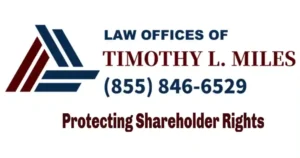Introduction to the Open Lending Class Action Lawsuit
The Open Lending class action lawsuit seeks to represent purchasers or acquirers of Open Lending Corporation (NASDAQ: LPRO) securities between February 24, 2022 and March 31, 2025, inclusive (the “Class Period”). Captioned Bradley v. Open Lending Corporation, No. 25-cv-00650 (W.D. Tex.), the Open Lending class action lawsuit charges Open Lending and certain of Open Lending’s current and former top executives with violations of the Securities Exchange Act of 1934.

If you suffered substantial losses and wish to serve as lead plaintiff of the Open Lending class action lawsuit or just have general questions about you rights as a shareholder, please contact attorney Timothy L. Miles of the Law Offices of Timothy L. Miles, at no cost, by calling 855/846-6529 or via e-mail at [email protected]. Lead plaintiff motions for the Open Lending class action lawsuit must be filed with the court no later than June 30, 2025.
Overview of the Open Lending Lawsuit
The Open Lending lawsuit centers on allegations of misleading investors through the provision of inaccurate or incomplete information regarding the company’s financial status and operations. Such allegations, if proven true, could result in significant legal and financial consequences for Open Lending. You need to grasp the magnitude of these claims and their potential impact on the company’s future.

Understanding the Open Lending class action lawsuit requires analyzing the details of the allegations. Investors claim that Open Lending’s disclosures were not as transparent as they should have been, leading to financial losses once the truth was revealed. Legal experts are examining whether there was a deliberate attempt to mislead stakeholders, which could lead to punitive measures.
For anyone involved in investing, the Open Lending class action lawsuit serves as a stark reminder of the importance of due diligence and the risks associated with corporate investments. As you navigate through the nuances of this case, consider how transparency and accountability play pivotal roles in maintaining investor trust and confidence in the market.
Allegations in the Open Lending Class Action Lawsuit
Open Lending provides lending enablement and risk analytics solutions to credit unions, regional banks, finance companies, and captive finance companies of automakers.
The Open Lending class action lawsuit alleges that defendants throughout the Class Period made false and/or misleading statements and/or failed to disclose that: (i) defendants misrepresented the capabilities of Open Lending’s risk-based pricing model; (ii) defendants issued materially misleading statements regarding Open Lending’s profit share revenue; (iii) defendants failed to disclose Open Lending’s 2021 and 2022 vintage loans had become worth significantly less than their corresponding outstanding loan balances; and (iv) defendants misrepresented the underperformance of Open Lending’s 2023 and 2024 vintage loans.
The Open Lending class action lawsuit further alleges that on March 17, 2025, Open Lending disclosed that it would be unable to timely file its Annual Report for 2024 as it “require[d] additional time to finalize its accounting and review processes specifically related to its profit share revenue and related contract assets.” On this news, the price of Open Lending stock fell more than 9%, according to the complaint.
Then, on March 31, 2025, the Open Lending class action lawsuit alleges that Open Lending released its fourth quarter and full year 2024 financial results, revealing quarterly revenue of negative $56.9 million due in part to “a $81.3 million reduction in estimated profit share revenues related to business in historic vintages” “primarily due to heightened delinquencies and corresponding defaults associated with loans originated in 2021 through 2024.”
Open Lending also disclosed a net loss of $144 million, due to Open Lending being “negatively impacted by the recording of a valuation allowance on [its] deferred tax assets of $86.1 million, which increased [its] income tax expense during the period,” according to the complaint. Open Lending additionally announced that it had appointed a new CEO as well as a new COO, effective immediately, both of whom would be replacing defendant Charles D. Jehl, who had been operating as Open Lending’s CEO, COO, and CFO simultaneously, the complaint further alleges.
The Open Lending class action lawsuit alleges that on this news, the price of Open Lending stock fell nearly 58%.
Understanding the Notice Process When a Class Action Settles

When a class action lawsuit reaches a settlement, a crucial step in the legal process is the notification of affected individuals. This notice serves as a formal communication to inform potential class members about their rights, the nature of the settlement, and the actions they may take. Understanding this process is essential for anyone who may be impacted by a class action, such as those involved in the Open Lending class action lawsuit.
What is a Class Action Lawsuit?
A class action lawsuit is a legal proceeding where a group of individuals collectively brings a claim to court against a defendant, typically a corporation or organization. This type of lawsuit is often pursued when the same issue affects a large number of people in a similar manner, allowing them to combine their resources and claims into a single action.
Key Characteristics of Class Actions
- Commonality: The claims of the class members must share common legal or factual issues.
- Numerosity: The group must be large enough that joining all members individually would be impractical.
- Typicality: The claims of the representative parties must be typical of those of the class.
- Adequacy: The representatives must adequately protect the interests of the class.

These characteristics ensure that the class action is a suitable method for resolving the claims of many individuals efficiently.
The Role of Notices in Class Action Settlements
Notices play a pivotal role in the class action process, particularly when a settlement is reached. They serve to inform class members about the settlement terms, their rights, and the steps they need to take as may be the case in the Open Lending class action lawsuit.
Types of Notices
- Notice of Class Action Lawsuit: This initial notice informs potential class members about the lawsuit and their inclusion in the class. It outlines the allegations against the defendant and provides instructions on how to opt out if they choose to pursue individual claims.
- Legal Notice of Settlement: Once a settlement is proposed, this notice is sent to inform class members about the settlement terms, including compensation details and deadlines for filing claims or objections as will be done if their is a settlement in the Open Lending class action lawsuit.
The Notice Process Explained
The notice process involves several key steps that ensure all affected individuals are informed and have the opportunity to respond. All individuals or entities who are class members in the Open Lending class action lawsuit.
Step 1: Identification of Class Members
The first step in the notice process is identifying individuals who may be affected by the class action. This is typically done through discovery, where attorneys gather information about potential class members from the defendant’s records.
Step 2: Drafting the Notice
Once class members are identified, the next step is drafting the notice. This document must clearly outline:
- The nature of the lawsuit
- The allegations against the defendant
- The terms of the proposed settlement
- Instructions for filing claims or opting out
Step 3: Distribution of the Notice
After court approval, notices can be distributed through various methods, including:
- Direct Mail: Sending physical copies of the notice to identified class members.
- Email: Utilizing electronic communication for faster delivery.
- Publications: If class members cannot be identified, notices may be published in newspapers or online platforms to reach a broader audience.
Step 4: Court Approval
Before the settlement can be finalized, the court must approve the notice and the proposed settlement. This involves a fairness hearing where class members can voice their opinions or objections.
Understanding Your Rights as a Class Member in the Tempus AI Class Action Lawsuit
Receiving a notice related to a class action settlement means you have specific rights and options. It is crucial to understand these to make informed decisions. If you receive a notice after a proposed settlement in the Open Lending class action lawsuit, you basically have three options

Right to Participate
Class members have the right to participate in the settlement. This typically involves filing a claim to receive compensation as outlined in the notice.
Right to Opt-Out
If you prefer not to be part of the Open Lending class action lawsuit, you have the option to opt out. This means you can pursue your own individual lawsuit against the defendants. However, opting out also means you will not receive any benefits from the class action settlement in the Open Lending class action lawsuit.
Right to Object
Class members can object to the proposed settlement if they believe it is unfair or inadequate. The notice will provide instructions on how to submit an objection, which will be considered during the court hearing and you are allowed to attend the hearing if you desire.
Important Deadlines to Remember
Notices will include critical deadlines that class members must adhere to. Missing these deadlines can result in losing the right to participate in the settlement or to opt out.
Common Deadlines Include:
- Claim Filing Deadline: The last date to submit a claim for compensation.
- Opt-Out Deadline: The final date to notify the court of your decision to opt out of the class action.
- Objection Deadline: The last date to submit any objections to the proposed settlement.
The Importance of Reading the Notice Carefully
It is essential for class members to read the notice thoroughly. The document contains vital information regarding your rights, the settlement terms, and the actions you may take.
Key Sections to Focus On:
- Settlement Terms: Understand what compensation is being offered and how it will be distributed.
- Instructions for Claims: Follow the provided steps to ensure your claim is filed correctly.
- Contact Information: Use the contact details provided for any questions or clarifications regarding the notice or the settlement process.

The Impact of the Tempus AI Class Action Lawsuit
The Open Lending class action lawsuit is a significant case that highlights the importance of the notice process. Individuals affected by this lawsuit should pay close attention to the notices they receive, as they will outline their rights and options moving forward.
Background of the Tempus AI Lawsuit
The Open Lending lawsuit involves allegations against Open Lending regarding practices that may have harmed shareholders through false and misleading financial statements. As the case progresses, affected individuals will receive notices detailing the developments and any proposed settlements.
What to Expect Moving Forward
As the Open Lending lawsuit unfolds, class members can expect to receive updates through notices. These communications will provide essential information about the status of the case and any actions required on their part.
Conclusion

The notice process in class action settlements is a critical component that ensures affected individuals are informed and can exercise their rights afforded to them under the Due Process Clause. Understanding this process, especially in the context of the Open Lending lawsuit, empowers class members to make informed decisions regarding their participation in the legal proceedings. By carefully reading the notices and adhering to deadlines, individuals can navigate the complexities of class action lawsuits effectively.
In summary, whether you are a potential class member in the Open Lending lawsuit or any other class action, being proactive and informed is key to protecting your rights and interests.
Tips for Investors Moving Forward to Protect Their Investment
Gathering and Organizing Relevant Evidence

In a securities class action lawsuit just like the Open Lending class action lawsuit, evidence is the cornerstone of building a compelling case. For shareholders, gathering and organizing relevant evidence is a critical step in substantiating claims of corporate misconduct. The evidence typically revolves around documents and communications that demonstrate the company’s misrepresentations or omissions, as well as the financial harm suffered by shareholders. Below are some steps you should take:
- Compile all financial statements, press releases, analyst reports, emails, and any internal documents that shed light on the alleged wrongdoing alleged in the Open Lending class action lawsuit.
- Meticulously document your investment history with the Tempus AI, including dates of stock purchases and sales, quantities, and prices. This information is crucial for calculating damages and proving that the shareholder suffered financial losses as a result of the company’s actions.
- Maintaining detailed records not only strengthens the individual’s position in the lawsuit but also contributes to the overall strength of the Open Lending class action lawsuit, by providing a clear picture of the impact on shareholders.
- Organizing this evidence in a systematic manner is equally important. Shareholders can create a comprehensive file of all relevant documents, categorized by type and date, to facilitate easy retrieval and review by legal counsel.
This preparation not only aids in the efficient prosecution of the Open Lending lawsuit, but also demonstrates the shareholder’s commitment and readiness to actively participate in the litigation process.
By thoroughly gathering and organizing evidence, shareholders lay a solid foundation for holding corporations accountable and seeking redress for their financial injuries.
Staying Informed: Monitoring Case Developments
In the fast-paced environment of securities class action lawsuits, staying informed about case developments is crucial for shareholders. As the Open Lending class action lawsuit, moves forward, new information and events can significantly impact the strategy and potential outcomes. Tempus AI shareholders must actively monitor key milestones, such as court rulings, settlement negotiations, and any changes in the legal landscape. Keeping abreast of these developments ensures that shareholders are well-positioned to make timely and informed decisions.
Effective communication with legal counsel is essential for staying updated on case developments. Attorneys provide regular updates and analyses of the ongoing proceedings, helping shareholders understand the implications of each development. This information is vital for assessing the potential risks and benefits of different courses of action, such as whether to accept a settlement offer or continue pursuing the Open Lending class action lawsuit.
By maintaining open lines of communication with their legal team, shareholders can remain engaged and proactive throughout the litigation process.
Shareholders can also benefit from following news sources and industry reports related to the Open Lending lawsuit and the defendant company. These sources can provide valuable insights into broader market trends, regulatory changes, and public perceptions that may influence the case. By staying informed, shareholders can better anticipate shifts in the legal and financial landscape, enabling them to adapt their strategies and protect their interests effectively.
In securities class actions, knowledge is power, and staying informed is a key component of successful participation.
Contact Timothy L. Miles Today About an Tempus AI lawsuit Class Action Lawsuit
If you suffered losses in Tempus AIstock, call us today for a free case evaluation about a Open Lending class action lawsuit. 855-846-6529 or [email protected] (24/7/365).
Timothy L. Miles, Esq.
Law Offices of Timothy L. Miles
Tapestry at Brentwood Town Center
300 Centerview Dr. #247
Mailbox #1091
Brentwood,TN 37027
Phone: (855) Tim-MLaw (855-846-6529)
Email: [email protected]
Website: www.classactionlawyertn.com



